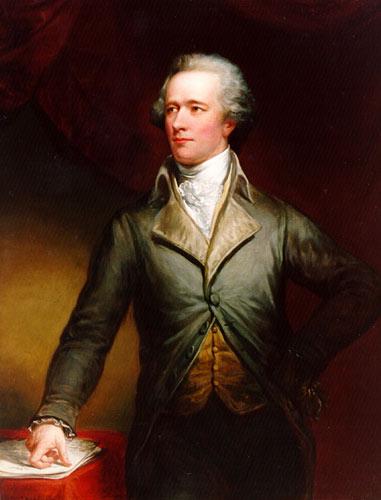|
|
Online Texts for Craig White's Literature Courses
|
|
|
Selections from The Federalist (a.k.a. The Federalist Papers) 1787-88 Federalist # 9: The by Alexander Hamilton |
|
[9.1] A
firm
[9.2] From the
disorders that disfigure the annals
[historical records]
of those republics
the advocates of despotism
[tyranny or authoritarian government]
have drawn
arguments, not only against the forms of
republican government, but against the very principles of civil liberty
[human
rights].
They have decried all free government as
inconsistent with the order of society, and have indulged themselves in
malicious exultation over its friends and partisans. Happily for mankind,
stupendous fabrics [awesome structures or
frameworks] reared on the
basis of liberty, which have flourished for ages, have, in a few glorious
instances, refuted their gloomy sophisms [flawed
arguments]. And, I
trust,
[9.3] But it is not to be denied that the
portraits they have sketched of republican government were too just copies
[painfully accurate accounts]
of the originals
[actual histories]
from which they were taken. If
it had been found impracticable to have devised models of a more perfect
structure, the enlightened friends to liberty would have been obliged to abandon
the cause of that species of government [a
republic] as
indefensible. The science of politics,
however, like most other sciences, has received great improvement.
The efficacy of
various principles is now well understood, which were either not known at all,
or imperfectly known to the ancients. [<Enlightenment
principles aren’t utopian or
perfectionist, but they do admit the possibility of progress; classical models
are meant to be improved on, not slavishly copied.]
The regular distribution
of power into distinct departments; the introduction of legislative
balances and checks; the institution
of courts composed of judges holding
their offices during good behavior; the
representation of the people in the
legislature by deputies of their own election: these are wholly new discoveries,
or have made their principal progress towards perfection in modern times.
They are means, and powerful means, by which
the excellences of republican government
may be retained and its imperfections lessened or avoided. To this catalogue
of circumstances that tend to the amelioration of popular systems of civil
government, I shall venture, however novel it may appear to some, to
add one more, on a principle which
has been made the foundation of an objection to the new Constitution; I mean
the
enlargement of the
orbit
within which such systems are to revolve,
[<astronomical metaphor; cf. Thomas Paine,
The Age of Reason]
either in respect to the
dimensions of a single State or to the
consolidation of several smaller States into one great Confederacy. . . .
[9.4] The utility of a Confederacy, as well
to suppress faction [division]
and to guard the internal
tranquility of States, as to increase their external force and security, is in
reality not a new idea. It has been practiced upon in different countries and
ages, and has received the sanction of the most approved writers on the subject
of politics. The opponents of the plan
proposed have, with great assiduity, cited and circulated the observations of
Montesquieu [French political thinker,
1689-1755]
on the necessity of a contracted
[limited]
territory for a republican
government. But they
seem not to have been apprised of the sentiments of that great man expressed in
another part of his work . . . .
[9.5] When Montesquieu recommends a small extent for
republics, the standards he had in view were of dimensions far short of the
limits of almost every one of these States. Neither
[9.6] A distinction, more subtle than accurate, has been
raised
between a
confederacy and a
consolidation
of the States. The essential characteristic of
the first [confederacy]
is said to be, the
restriction of its authority to the
members in their collective capacities, without reaching to the individuals
of whom they are composed. It is contended that the national council ought to
have no concern with any object of internal administration. An exact equality of
suffrage between the members has also been insisted upon as a leading feature of
a confederate government. [<as in the
pre-1900s U.S. Senate]
. . .
[9.7] The definition of a
confederate republic
seems simply to be "an assemblage of societies,''
or an association of two or more states into one state. The extent,
modifications, and objects of the federal authority are mere matters of
discretion. So long as the separate organization of the members be not
abolished; so long as it exists, by a constitutional necessity, for local
purposes; though it should be in perfect
subordination to the general authority of the union, it would still be, in fact
and in theory, an association of states, or a confederacy. The proposed
Constitution, so far from implying an abolition of the State governments, makes
them constituent parts of the national sovereignty, by allowing them a direct
representation in the Senate, and leaves in their possession certain exclusive
and very important portions of sovereign power.
[<retention of “states’
rights” in federal union]
This fully corresponds, in every rational import
of the terms, with the idea of a federal government. . . .
PUBLIUS.

Hamilton,
award-winning 2014-16 musical
based on 2004 biography Alexander Hamilton
by Ron Chernow

Alexander Hamilton (1755-1804), first secretary of Treasury


